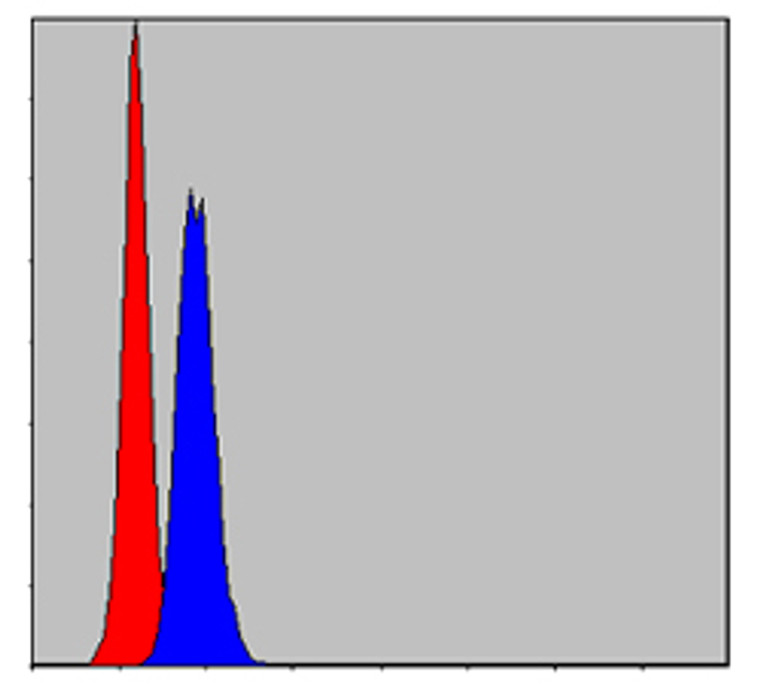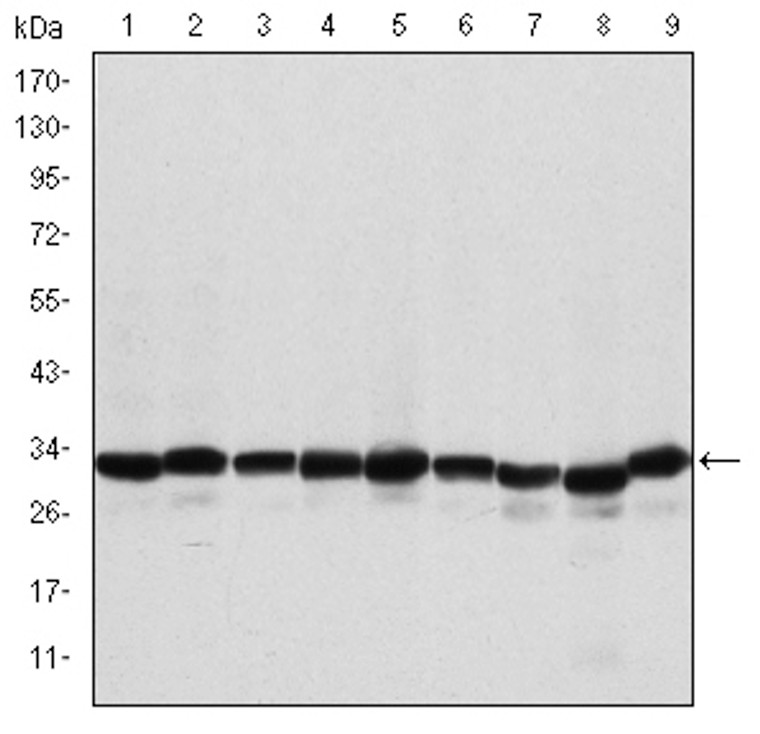| Host: |
Mouse |
| Applications: |
WB/IHC/IF/FC/ELISA |
| Reactivity: |
Human/Mouse/Rat/Monkey |
| Note: |
STRICTLY FOR FURTHER SCIENTIFIC RESEARCH USE ONLY (RUO). MUST NOT TO BE USED IN DIAGNOSTIC OR THERAPEUTIC APPLICATIONS. |
| Short Description: |
Mouse monoclonal antibody anti-Prohibitin 1 is suitable for use in Western Blot, Immunohistochemistry, Immunofluorescence, Flow Cytometry and ELISA research applications. |
| Clonality: |
Monoclonal |
| Clone ID: |
5H7 |
| Conjugation: |
Unconjugated |
| Isotype: |
IgG1 |
| Formulation: |
Liquid in PBS containing 0.03% Sodium Azide, 0.5% BSA, 50% Glycerol. |
| Purification: |
Affinity purification |
| Dilution Range: |
WB 1:500-1:2000IHC 1:200-1:1000IF 1:200-1:1000FC 1:200-1:400ELISA 1:10000 |
| Storage Instruction: |
Store at-20°C for up to 1 year from the date of receipt, and avoid repeat freeze-thaw cycles. |
| Gene Symbol: |
PHB1 |
| Gene ID: |
5245 |
| Uniprot ID: |
PHB1_HUMAN |
| Specificity: |
Prohibitin Monoclonal Antibody detects endogenous levels of Prohibitin protein. |
| Immunogen: |
Purified recombinant fragment of human Prohibitin expressed in E. Coli. |
| Function | Protein with pleiotropic attributes mediated in a cell-compartment- and tissue-specific manner, which include the plasma membrane-associated cell signaling functions, mitochondrial chaperone, and transcriptional co-regulator of transcription factors in the nucleus. Plays a role in adipose tissue and glucose homeostasis in a sex-specific manner. Contributes to pulmonary vascular remodeling by accelerating proliferation of pulmonary arterial smooth muscle cells. In the mitochondria, together with PHB2, forms large ring complexes (prohibitin complexes) in the inner mitochondrial membrane (IMM) and functions as chaperone protein that stabilizes mitochondrial respiratory enzymes and maintains mitochondrial integrity in the IMM, which is required for mitochondrial morphogenesis, neuronal survival, and normal lifespan (Probable). The prohibitin complex, with DNAJC19, regulates cardiolipin remodeling and the protein turnover of OMA1 in a cardiolipin-binding manner. Regulates mitochondrial respiration activity playing a role in cellular aging. The prohibitin complex plays a role of mitophagy receptor involved in targeting mitochondria for autophagic degradation. Involved in mitochondrial-mediated antiviral innate immunity, activates RIG-I-mediated signal transduction and production of IFNB1 and pro-inflammatory cytokine IL6. In the nucleus, acts as a transcription coregulator, enhances promoter binding by TP53, a transcription factor it activates, but reduces the promoter binding by E2F1, a transcription factor it represses. Interacts with STAT3 to affect IL17 secretion in T-helper Th17 cells. In the plasma membrane, cooperates with CD86 to mediate CD86-signaling in B lymphocytes that regulates the level of IgG1 produced through the activation of distal signaling intermediates. Upon CD40 engagement, required to activate NF-kappa-B signaling pathway via phospholipase C and protein kinase C activation. |
| Protein Name | Prohibitin 1 |
| Database Links | Reactome: R-HSA-5673000Reactome: R-HSA-6802946Reactome: R-HSA-6802955Reactome: R-HSA-8949664Reactome: R-HSA-9649948 |
| Cellular Localisation | Mitochondrion Inner MembraneNucleusCytoplasmCell Membrane |
| Alternative Antibody Names | Anti-Prohibitin 1 antibodyAnti-PHB1 antibodyAnti-PHB antibody |
Information sourced from Uniprot.org
12 months for antibodies. 6 months for ELISA Kits. Please see website T&Cs for further guidance

![Anti-PHB1 antibody [5H7] (STJ98339)](https://cdn11.bigcommerce.com/s-zso2xnchw9/images/stencil/760x760/products/120487/230440/STJ98339_5_ELISA__28705.1602854730.jpg?c=1)






![Anti-Chromogranin A antibody [5H7] (STJ16101718) Anti-Chromogranin A antibody [5H7] (STJ16101718)](https://cdn11.bigcommerce.com/s-zso2xnchw9/images/stencil/300x300/products/152224/347076/STJ16101718_1__76856.1681999337.jpg?c=1)
